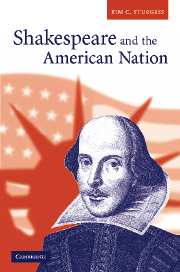Book contents
- Frontmatter
- Contents
- Acknowledgements
- Epigraph
- Prologue
- Introduction
- PART ONE THE PARADOX
- PART TWO THE APPROPRIATION
- 3 Beginning the appropriation of Shakespeare and the ‘First American Edition’ of his works
- 4 Jacksonian energy – Shakespearean imagery
- 5 Context for appropriation in nineteenth-century America
- 6 The American heroic and ownership of Shakespeare
- 7 Shakespeare as a fulcrum for American literature
- 8 The American Scholar and the authorship controversy
- 9 Last scenes in the final act of appropriation
- Epilogue
- Appendix 1
- Appendix 2
- Bibliography
- Index
8 - The American Scholar and the authorship controversy
Published online by Cambridge University Press: 05 July 2014
- Frontmatter
- Contents
- Acknowledgements
- Epigraph
- Prologue
- Introduction
- PART ONE THE PARADOX
- PART TWO THE APPROPRIATION
- 3 Beginning the appropriation of Shakespeare and the ‘First American Edition’ of his works
- 4 Jacksonian energy – Shakespearean imagery
- 5 Context for appropriation in nineteenth-century America
- 6 The American heroic and ownership of Shakespeare
- 7 Shakespeare as a fulcrum for American literature
- 8 The American Scholar and the authorship controversy
- 9 Last scenes in the final act of appropriation
- Epilogue
- Appendix 1
- Appendix 2
- Bibliography
- Index
Summary
The names of the plays that Shakespeare wrote are household words in the mouths of mighty nations.
Theodore RooseveltAs Shakespeare became widely accepted as a heroic exemplar, a new academic phenomenon arose that appeared to challenge the still emerging bardolatry. Published first in America, questions were raised as to Shakespeare's authorship of the plays. This was not simply a challenge to the accepted identity of the playwright, however. The most prominent name behind the authorship controversy sought to link the playwright irrevocably with the revolutionary ideology behind the foundation of the American nation.
The first public challenge to William Shakespeare's authorship was made in an obscure book by Joseph C. Hart, a New York lawyer and journalist and later a consul for the United States. In 1848 Hart published The Romance of Yachting, a book presented to readers as an account of a sailing trip across the Atlantic to Spain. Despite the title, it contained a discourse on ‘several favorite and prevailing historical assumptions, which the author … made object of [his] dissent’. Among these ‘dissents’, Hart proposed to rename the city of New York removing what he argued was the ‘badge of colonial slavery’, and he attacked the tradition of the iconic New England Puritans, preferring to champion the role of the ‘Knickerbocker race’ of Dutch New Amsterdam. Both these ‘dissents’ suggest the continuing prevalence of an anti-English sentiment that perhaps also lay behind Hart's challenge over Shakespeare.
- Type
- Chapter
- Information
- Shakespeare and the American Nation , pp. 168 - 180Publisher: Cambridge University PressPrint publication year: 2004



